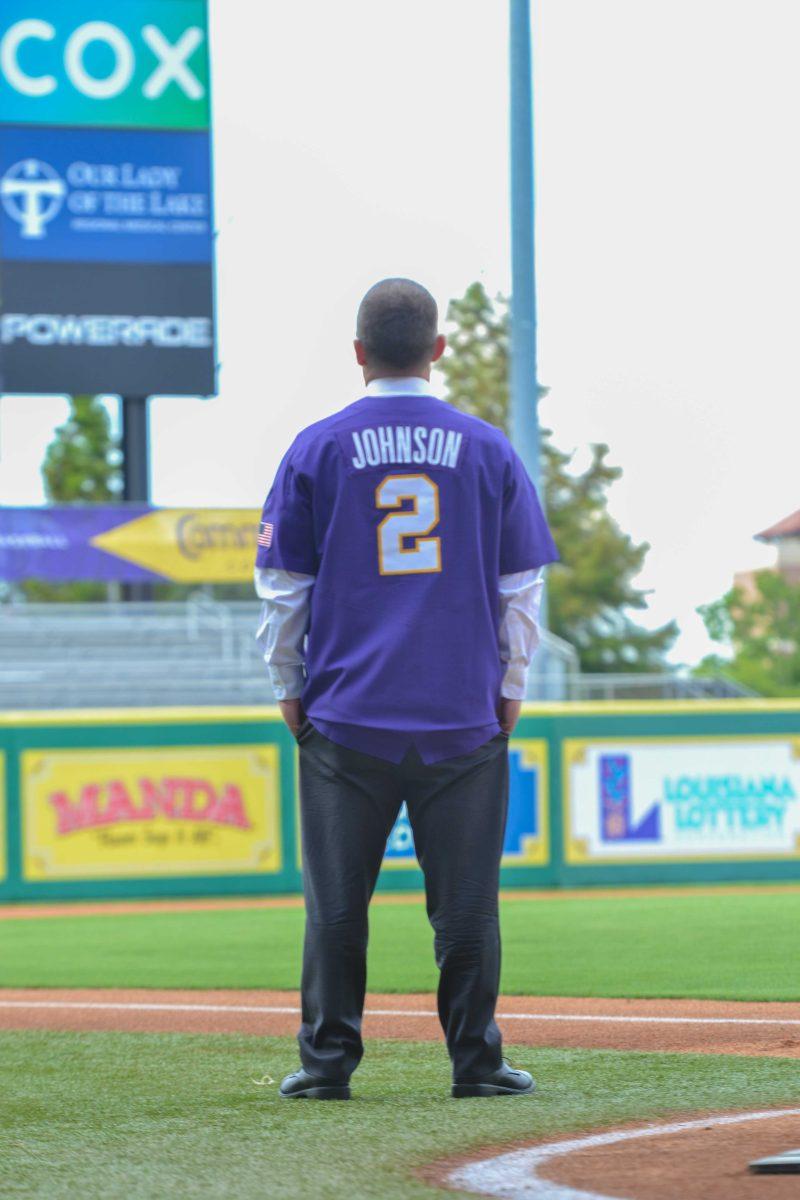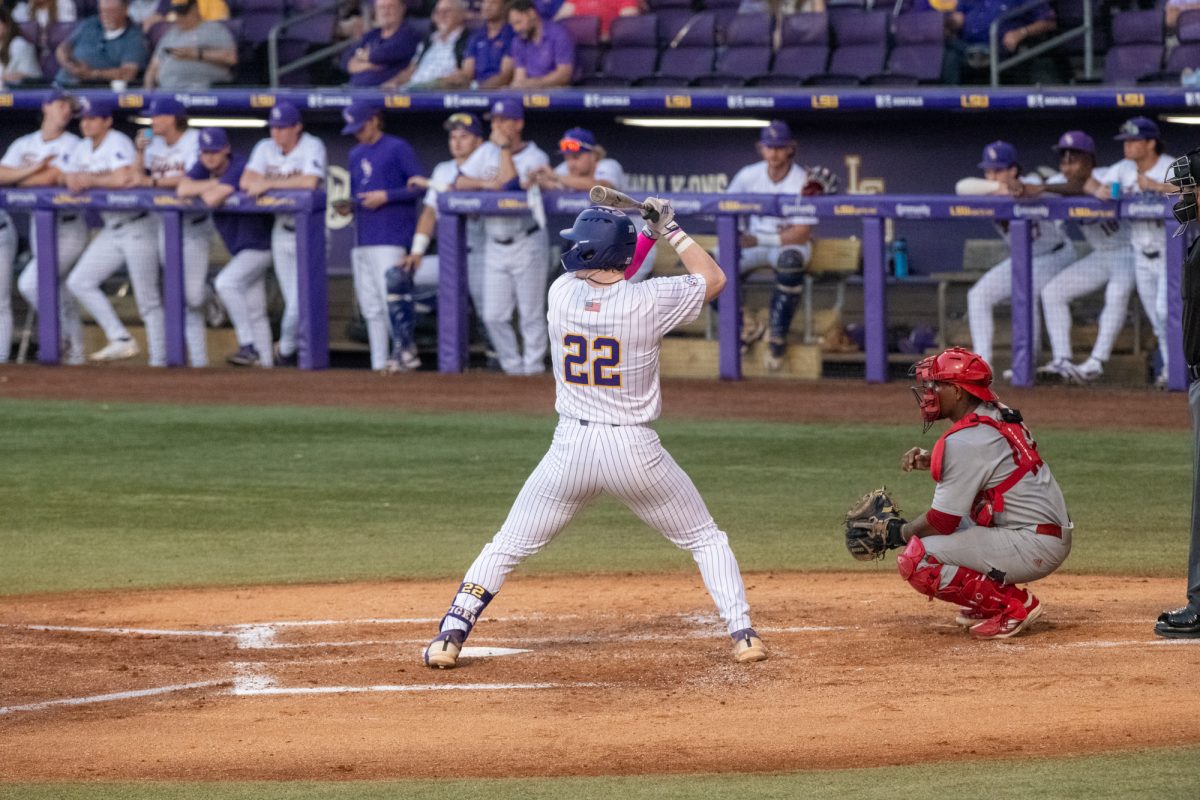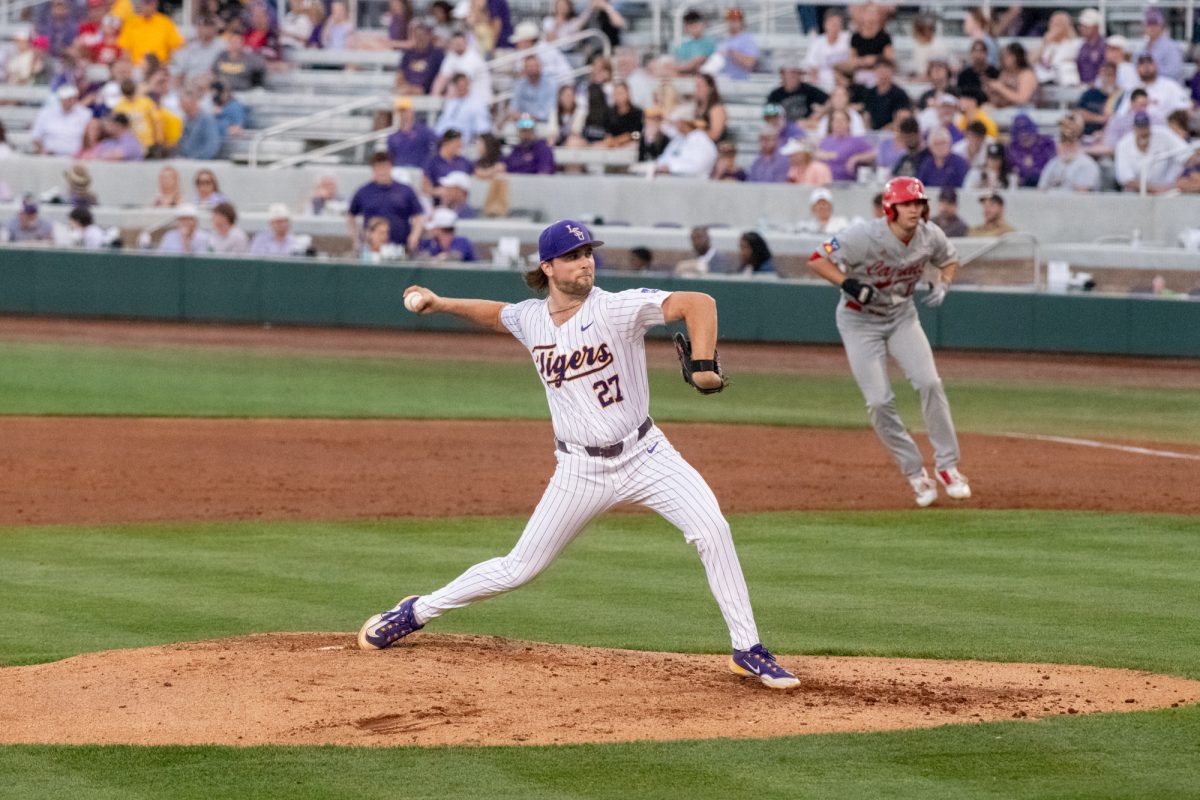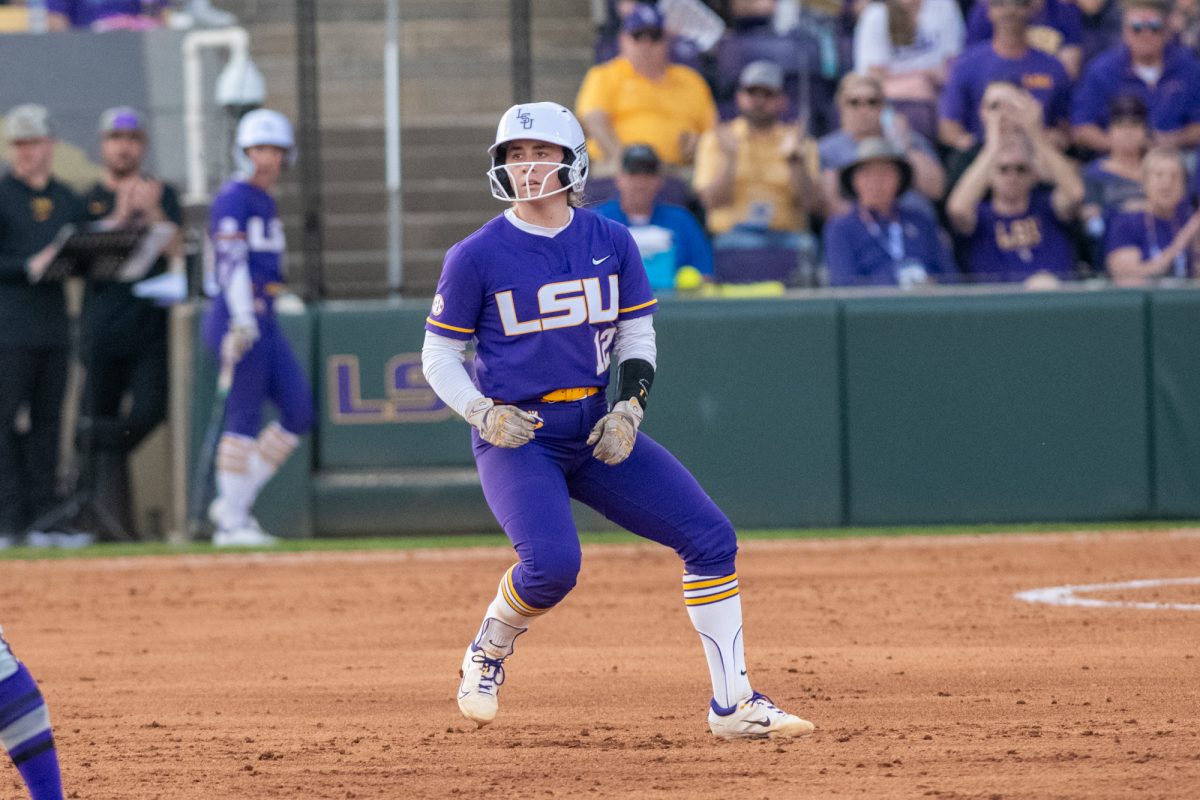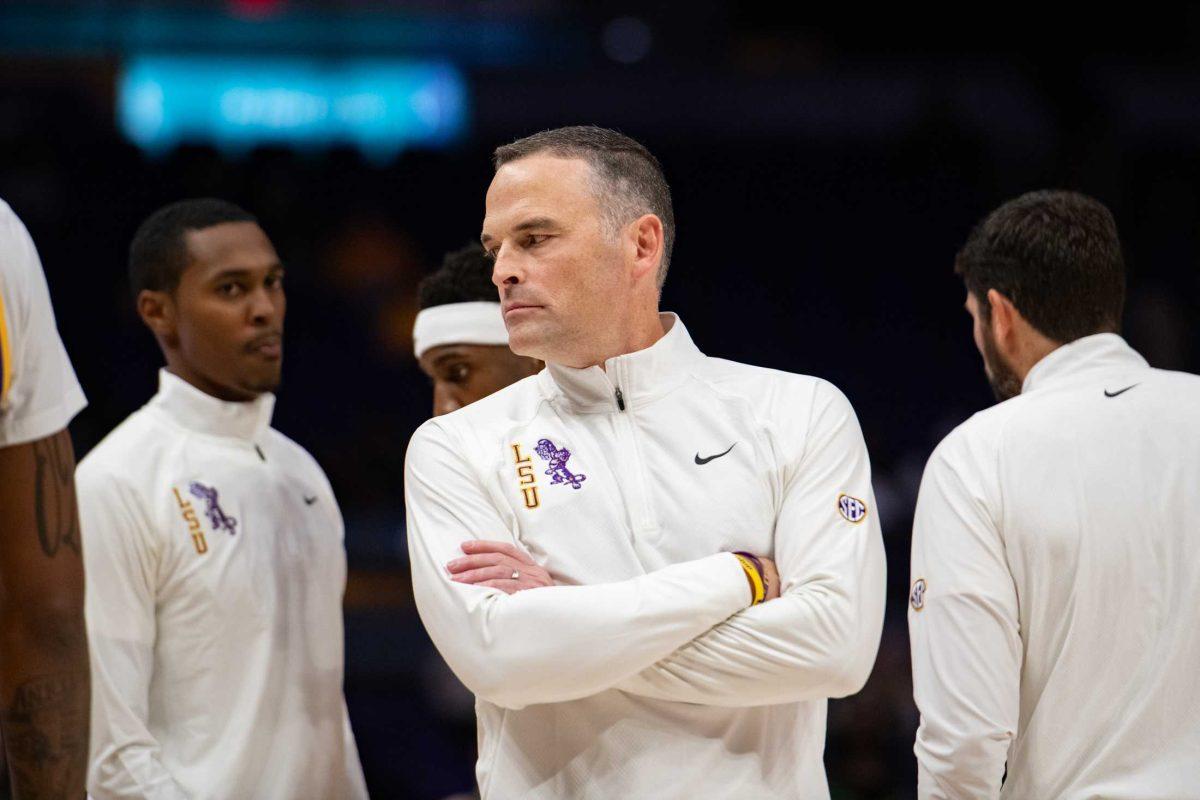We are just under a month away from the start of another LSU baseball season, with plenty of preseason coverage to come. For now, in this first season of new head coach Jay Johnson’s tenure, a season that will shape the future of LSU baseball, here are five big questions that will predicate LSU’s potential to make a run to Omaha, Nebraska and to a national championship.
1. What could the pitching staff look like?
With a new coaching staff in place, fans would be wise to set new expectations from what former Head Coach Paul Mainieri had in place. Johnson was quick to alert followers of the program that the LSU standard of three starting pitchers for the weekend rotation would most likely not continue. Instead, he may be adapting modern baseball philosophies of pitching five to six of his players out of the bullpen – akin to that of some major league teams using an opener to start the game and following him with a plethora of bullpen options.
With the talent this team has, it is easy to see why. LSU returned 10 pitchers from last year’s staff, including seniors Devin Fontenot, Ma’Khail Hilliard and Trent Vietmeier. Sophomores Ty Floyd, Garrett Edwards, Will Hellmers, Blake Money, Jacob Hasty, Michael Fowler and Javen Coleman who contributed to LSU’s super regional run often last season, and they will surely be used often with a season’s worth of experience under their belts. Coleman and Floyd were named to Perfect Game’s Top 100 Sophomores for the season.
On top of the program’s veterans, there are a number of newcomers. San Francisco transfer Eric Reyzelman, who was named to Perfect Game’s Top 100 Juniors, will fit into Johnson’s staff right away. A couple of Johnson’s players from Arizona followed him to LSU, Bryce Collins and Riley Cooper. With JUCO transfers and freshmen behind them for support, the pitching has all the makings to be one of the best in their conference. How Johnson will navigate playing them remains to be seen, and it should be LSU fans’ primary focus in the early season.
2. Who will start on the infield?
The LSU infield has a history of producing talented prospects, and this season will be no different despite the new Tiger manager. There will be at least one certainty, and that is sophomore Tre’ Morgan’s presence at first base. The product of Brother Martin High School in New Orleans set the conference on fire with his phenomenal hitting and even more spectacular defense. Morgan slashed .357/.441/.526 in his stellar freshman season.
The rest of the infield seems to have some shape, but exact positions are unclear as of now. Uber-talented players in junior Cade Doughty and Arizona transfer sophomore Jacob Berry will be daily fixtures, but whether Doughty will retain his former spot at third base, or if Berry will take over there and Doughty will move to second base is something to watch for. At shortstop, sophomore Jordan Thompson will have the lead on his teammates for playing time, but it will fluctuate throughout the season with sophomore defensive stud Collier Cranford and high-energy sophomore Will Safford on his tail.
Behind the plate there may be a full-on position battle. Alex Milazzo is an established player with one of the best arms to catch runners stealing that LSU has had in a while. However, his bat has struggled in both seasons he has played in Baton Rouge, hitting just .135 last year. He is being closely followed by Hayden Travinski, a powerful bat who hasn’t had the opportunities due to injury, and the superb transfer Tyler McManus, a consistent force in fall baseball. The balance of Milazzo’s defense versus his teammates’ bats will be something Johnson will have to evaluate throughout the year.
3. How could the outfield logjam resolve itself?
LSU fans who have followed the team in the past are familiar with clusters in the outfield. With only three spots and so many players capable of playing the positions, there is often a bottleneck for playing time. LSU has generational talent in Dylan Crews and one of the best veteran bats in the country in Gavin Dugas, which narrows this congestion for starter status. Crews and Dugas led the team in OPS last season with respective stat lines of 1.116 and 1.048. Dugas was also awarded LSU’s coveted No. 8 jersey, given to the senior leader of the team.
This leaves one spot for normal playing time and so many deserving candidates to earn it. Johnson could opt for the speedy redshirt junior Giovanni DiGiacomo, the talented young bat of sophomore Brody Drost, veteran presences of redshirt juniors Drew Bianco and Cade Beloso, or the incoming gifted players like transfer Brayden Jobert or freshmen Josh Pearson and Josh Stevenson. How Johnson decides to fill out his lineup card early on may indicate as to how this will shake out.
4. Where could freshmen make an impact?
It is undeniable that this season’s roster contains a fountain of talent. With such a large number of irreplaceable veterans returning alongside a recruiting class ranked No. 6 in Collegiate Baseball magazine, deciphering the players that will make the starting nine is nearly impossible. A few transfers have also made their way to LSU, and they too have proven that they are deserving of a spot in The Box. Because of this, it is undeniable that Johnson is considering a true freshmen’s place on the starting lineup.
Among these freshmen are standouts such as Grant Fontenot, a right-handed pitcher from Lafayette. Fontenot was ranked first in the state for that position and 161st in the nation’s top 500 ranking. His fast ball has clocked in at around 94 mph, which is comparable to a lot of LSU’s front running pitchers.
Another standout is Josh Pearson, an outfielder from West Monroe. Pearson was ranked by Perfect Game as second in the state and 36th in the nation as an outfielder. He bats as a lefty and is speedy around the base paths, but his sturdy build gives his hits a ton of pop upon impact.
Joshua Stevenson is a Louisiana native that attended St. Thomas Moore High School, which has a baseball program known to produce quality D1 athletes. Stevenson is an outfielder and occasional left-handed pitcher with a lot of consistency behind the plate. Stevenson is the younger brother of Andrew Stevenson, a phenomenal starting centerfielder for the Tigers from 2013 to 2015. Andrew now plays for the Washington Nationals.
5. How will the coaching dynamics change from Paul Mainieri’s tenure?
Stepping into the shoes of the “Louisiana Legend” that is Paul Mainieri, is Jay Johnson, the head coach that led Arizona to a conference championship in 2021 and was later deemed the Pac-12 Baseball Coach of the Year. Johnson’s impact on other programs is what spiked the interest of Athletic Director Scott Woodward when deciding who would be the next one to lead LSU’s baseball program in a successful direction.
Walking into The Box and succeeding such an iconic baseball figure has to accompany an immense amount of pressure, but Johnson seems to be settling in nicely.
They say it takes a village, and this is exactly what Johnson has brought with him to the program. The new coaching staff is overflowing with experience and success, and Johnson has an incredible amount of confidence in their abilities to bring the Tigers to the next level.
As his right-hand man, Johnson brought with him Marc Wanaka. Wanaka has been a part of Johnson’s coaching staff since 2014 and has played a role in producing 12 All-American position players and 19 MLB Draft picks, 12 of which were selected in the first 10 rounds.
For the mound, Johnson wanted Jason Kelly. Deemed the 2018 National Assistant Coach of the Year in college baseball, Kelly helped the Arizona State Sun Devils lower their team ERA from a 4.93 to a 3.56. If not for the pandemic shortening the 2020 season, the team would have likely finished in the nation’s Top 100 in ERA, WHIP, strikeouts per nine innings, strikeouts/walks ratio and hits per nine innings.
Every team needs someone who is able to form a solid connection with future prospects. That’s why Johnson wanted Dan Fitzgerald, LSU Baseball’s recruiting coordinator and assistant coach. Fitzgerald was a top recruiter at the perennial tournament team Dallas Baptist. He ultimately left his position there to find a role similar to this under Johnson.
Before Johnson’s staff took over, Manieri’s staff was heavily involved in the development of these athletes. Coaches like Javi Sanchez, Eddie Smith, Alan Dunn and Nolan Cain each contributed to the team’s success in hitting, pitching and recruiting. Based on the resumes, it is reasonable to assume that Johnson and his hand-picked staff will be equally as engaged, if not more. Until the season officially starts, the chemistry and success of the coaching staff remains unseen but certainly gives fans something to watch for.



